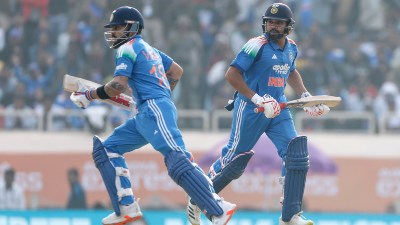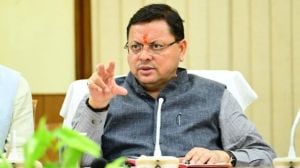THE GAG GANG
The Bheja Fry team has come up with another smart film, Mithya. We catch up with director Rajat Kapoor, Ranvir Shorey who plays the lead in the film and Vinay Pathak for a midnight chat on their films, chemistry, humour and8212;why Mughal-e-Azam is a comedy

The Bheja Fry team has come up with another smart film, Mithya. We catch up with director Rajat Kapoor, Ranvir Shorey who plays the lead in the film and Vinay Pathak for a midnight chat on their films, chemistry, humour and8212;why Mughal-e-Azam is a comedy
Let8217;s start at the beginning.
Vinay: I first met Rajat at Ketan Mehta8217;s office in 1995, when I had just come to Mumbai, then I met Ranvir in 1997, then Ranvir met Rajat and then I met both of them and it8217;s been happily ever after since.
Rajat: Those days none of us had work; only my wife Meenal did a bit of work.
Ranvir: I had a job.
Rajat: But we didn8217;t know him then, so it didn8217;t really benefit us.
Vinay: We had a lot of time together, so we decided to cook at Rajat8217;s suburban Mumbai pad.
Rajat: It was really like communal living. One friend would be doing good work and everybody would pile on8230;. Somebody taking pictures, another tipping him on acting. So everybody kind of supported each other. Vinay had a guest appearance in Raghu Romeo 2003. His first substantial role with us happened with Mixed Doubles.
Vinay: But much before that, we did the play C for Clowns together in 1999, which Ranvir joined later making it our first real working collaboration.
Rajat: Now, of course, we are so busy that we work together to be together. nbsp;
So what has kept you going?
Vinay: As if we had any other choice. What would I do? Would I end my life or keep pursuing the CA career I was already in? But no! One had to do this, there was no that.
Rajat: He8217;s right. Acting is like a terminal illness. It8217;s not as if you have a choice. If you want to make films you just can8217;t stop wanting to make films, you have to make them.
Humour or satire is common in all of your productions8212;Mixed Doubles 2006, Bheja Fry 2007, Mithya 20088230;. Wouldn8217;t you ever attempt any other genre?
Ranvir: Having spent close to a decade with these two gentlemen, I think humour is something inherent in us.
Rajat: Ranvir has extraordinary talent as a stand-up comic. The way Vinay can just talk funny for hours is astounding. Humour is definitely a part of me too; so whatever scripts I write I can8217;t keep it down, even in a tragedy like Mithya. I am not fond of mushiness or sentimentality, I run away from that. One way of running away is to go to humour.
Vinay: Also it8217;s a way of looking at things. I mean even in one of the most dramatic, serious mainstream films, Mughal-e-Azam, we can find places to really crack up, which today8217;s audiences will as well. For instance, whatever happens in the introduction scene of Ajit8217;s character Durjan Singh is like comic grammar. The girl, Suraiya approaches him coquettishly and the way he screams 8216;Badbakht ladki8230;8217; thrice is hysterical and it was played and treated in a comic way.
Rajat: So the point is that Mughal-e-Azam is actually a comedy, only we never saw it like that.
Ranvir: You just have to have a sense of humour. Actually humour lies in the eyes of the beholder.
You have been called the first successful camp of India8217;s independent cinema. What do you think is independent cinema?
Ranvir: It is our kind of cinema.
Rajat: The independence is in your thinking and vision. It8217;s not following the mainstream idiom; rather it8217;s trying to find your own course. That8217;s independent cinema.
Vinay: It8217;s also independent of the rigorous, stereotypical structure that we don8217;t have to follow nor have to break just because we are making a different kind of film. The story is still paramount.
Rajat: It8217;s also a broad umbrella under which you can have a Black Friday, a Parzania, a Honeymoon Travels and a Bheja Fry.
Vinay: It8217;s also the most wonderful time to be an actor. There are a lot of very talented filmmakers out there and there is a platform for all these wonderful storytellers to come up and tell their story. What more can an actor want than story-tellers of different kinds, genres, styles and budgets?
Rajat: About the camp, I think it was triggered by Bheja Fry8217;s success. Otherwise, nobody would have talked about it. We are just like-minded people who complement each other and want to do it again and again. When Mithya was written 10 years back, I wanted Naseeruddin Shah in the lead. But with every passing year the idea of the lead changed. At one point, I wanted Arshad Warsi, then Manoj Bajpai. I even gave the script to Shah Rukh Khan and thought of Saif Ali Khan, Vijay Raaz, but finally when we got the money, I thought Ranvir was the best possible bet for the role. And he proved everybody right. The advantage of working with friends is that we can push each other a little more.
So it8217;s basically all about working with friends8230;
Rajat: Well, where Vinay is right now in his career, he doesn8217;t have to work in a small role like Mithya as there are huge offers for him and Saurabh Shukla too, but that8217;s where the friendship part comes in. We stand by each other.
Vinay: Also I think at other places, one wouldn8217;t get a platform to play around that much.
Ranvir: In spite of my busy film schedules, I am doing theatre only because of the absolute joy of our rehearsals. I am not huge on the shows as I get really anxious in front of a live audience and just want the show to get over. The pure fun of hanging out with these guys that the rehearsals offer is just too much to resist. I am the youngest of the lot 8216;What rubbish?8217; Vinay and Rajat interrupt simultaneously with the latter adding, 8216;I am 36 and he is 378217; and look up to both of them in quite a few ways and am thankful that they are in my life.
Rajat: Now this is mushy. This is really getting mushy.
Ranvir: You do run away from it the sentimentality, I don8217;t.
Vinay: Do you want all of us to cry now?
Rajat: It8217;s great that even when we are not working with each other, we drop in at each other8217;s houses. Ranvir calls me very often, crying about his emotional life. Vinay calls a bit less now.
What movies have influenced your kind of comedy?
Vinay: Movies I grew up with like Padosan, Mughal-e-Azam, Mother India8230; Sunil Dutt, who was the film8217;s main character after Nargis was quite funny in his mannerisms and even the way he said 8216;Lala.8217; Incidentally, the film8217;s one scene I reacted to the most is also a funny one8212;it had Dutt sitting on a donkey, singing Na mein bhagwan hun8230;
Rajat: For me the greatest filmmaker ever across genres is Charlie Chaplin as actor, director and music director. I also like Fellini, Almodovar8230; they too have a sense of humour, though it8217;s a bit weird and grotesque; Billy Wilder, Woody Allen. In Hindi cinema, Kishore Kumar was the ultimate comic and Jaane Bhi Do Yaaro was the funny film that touched us most in recent times.
Ranvir: Between the two, they have listed all my favourites, though I also remember growing up on Jack Lemmon-Walter Matthau and the Johar-Mehmood kind of movies.nbsp;
Finally, is there anything in this plethora of offers and good times that you won8217;t do?
Vinay: Now that8217;s a very nice question. Rajat prompts Hamlet, Othello, Ophelia, Desdemona. I don8217;t think I would do Nirupa Roy8217;s role in Deewar but then why not? I know the dialogues, I know my lines as an actor and they are wonderful8230; 8216;Jisne tere baap ko gaali di, woh tera kaun tha? Koi nahin! Jisne tere haath pe likh diya tera baap chor hai, woh tera kaun tha? Koi nahin! Lekin main to teri apni maa thi8230;8217; On hindsight, I think I wouldn8217;t do a Manorama, Johnny Gaddar, Jism or a very similar kind of role again, but I would like to do a Nishabd because I didn8217;t do it, he did it8230;Rajat: From Nirupa Roy to Jiah Khan!
Vinay: I meant Mr Amitabh Bachchan8217;s role.
Rajat: I don8217;t think I want to make a Rs 20 crore film ever. I will continue making small films because I also think you get a lot of creative freedom. But within that genre, I would like to do subjects I haven8217;t done before.
Ranvir: I don8217;t think there8217;s any kind of role I wouldn8217;t like to sink my teeth into other than maybe a Nirupa Roy.
- 01
- 02
- 03
- 04
- 05































